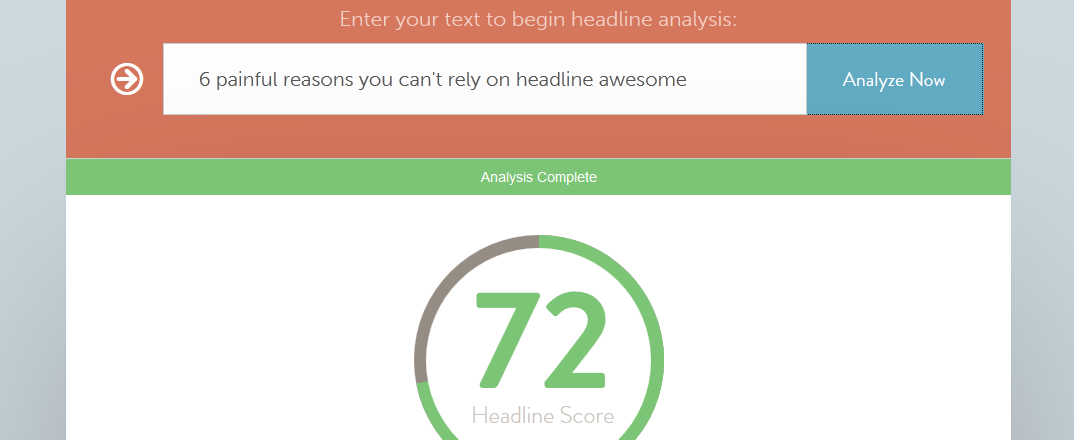A colleague of mine shared this tool in one of the Facebook group I’m a member of:
http://coschedule.com/headline-analyzer#
I don’t spend much time at all on Facebook, but I happened to see this post, and I couldn’t pass by without adding my two cents. Here’s a slightly modified version of my response:
This IS a cool tool, Jamal.
I’d just note that there are several important factors that this analyzer doesn’t take into consideration:
1) Whether a headline is strong or not is determined as much by WHO YOUR AUDIENCE IS as by the words you choose. Vegans won’t click on articles about making your steak tender and delicious, no matter how interesting the title looks.
2) Are your claims believable, or do they scream “Hype!”? It’s impossible for a machine to figure that out…
3) The formula used by the tool doesn’t know whether or not the headline is nonsense. As long as you put the right words in there, you’ll score high.
E.g. “how to startling orangutan spine surprises surprisingly” scores an 80 — but it doesn’t make any sense.
I entered the title of this post “6 Painful Reasons You Can’t Rely on Headline Analyzers,” which scored 66. When I switched “Analyzers” to “Awesome,” the score went up to 72 — even though the change destroys the headline.
(Both versions get an A+ for “structure, grammar and readability.”)
4) Some of the “right” words (“emotional” and “power” words listed in the free download Coschedule gives you when you opt in) are less powerful than you might think. “Awesome” is so overused that it will fall flat in many cases.
Again, you can’t know the right words unless you know who you’re talking to.
For example, financial copywriters know that “the Fed,” “Yellen” and “rate hike” have emotional punch that may not really work in any other industry.
5) As far as I can tell, this tool and the accompanying article focus on getting cold traffic to click on a blog post. It doesn’t — nor could it — calculate familiarity, relationship, name/brand recognition, etc.
The degree to which your readers know/trust you, enjoy your style and know you deliver value has a huge impact on your readership.
For example, if two articles have the exact same headline, who wins: Joe Schmoe or Seth Godin? More to the point, who wins a showdown between Seth Godin and Rachel Ray? Of course, that’s a trick question. It depends on the audience and topic.
Many of you have heard that one of the most opened and responded to emails sent during President Obama’s reelection campaign had “Hey” as the subject line.
“Hey” gets a zero on the headline analyzer, and as a blog title seen by cold traffic, maybe it should. But to people who know the Prez (or whoever), it sounds personal and really makes you curious to know what he has to say.
Email is a different animal, so keep that in mind.
6) If it sounds like you’re trying to sell something, you’ll have a different response than if it seems like you’re just sharing content.
If you’ve ever tried selling anything online, you know what I mean.
Having said all of that, I think the tool could be very helpful in helping your strengthen you headlines.
—–
Now, this critique is a bit of a nasty sandwich. One slice of positive at the beginning and end with a pile of negatives stuffed in between. I DO think tools like these can be helpful in making writers think creatively about how they’re crafting headlines and openers.
Just keep in mind that a you can communicate with your audience better than a machine ever could.

